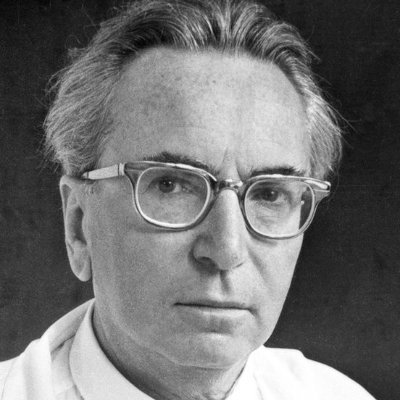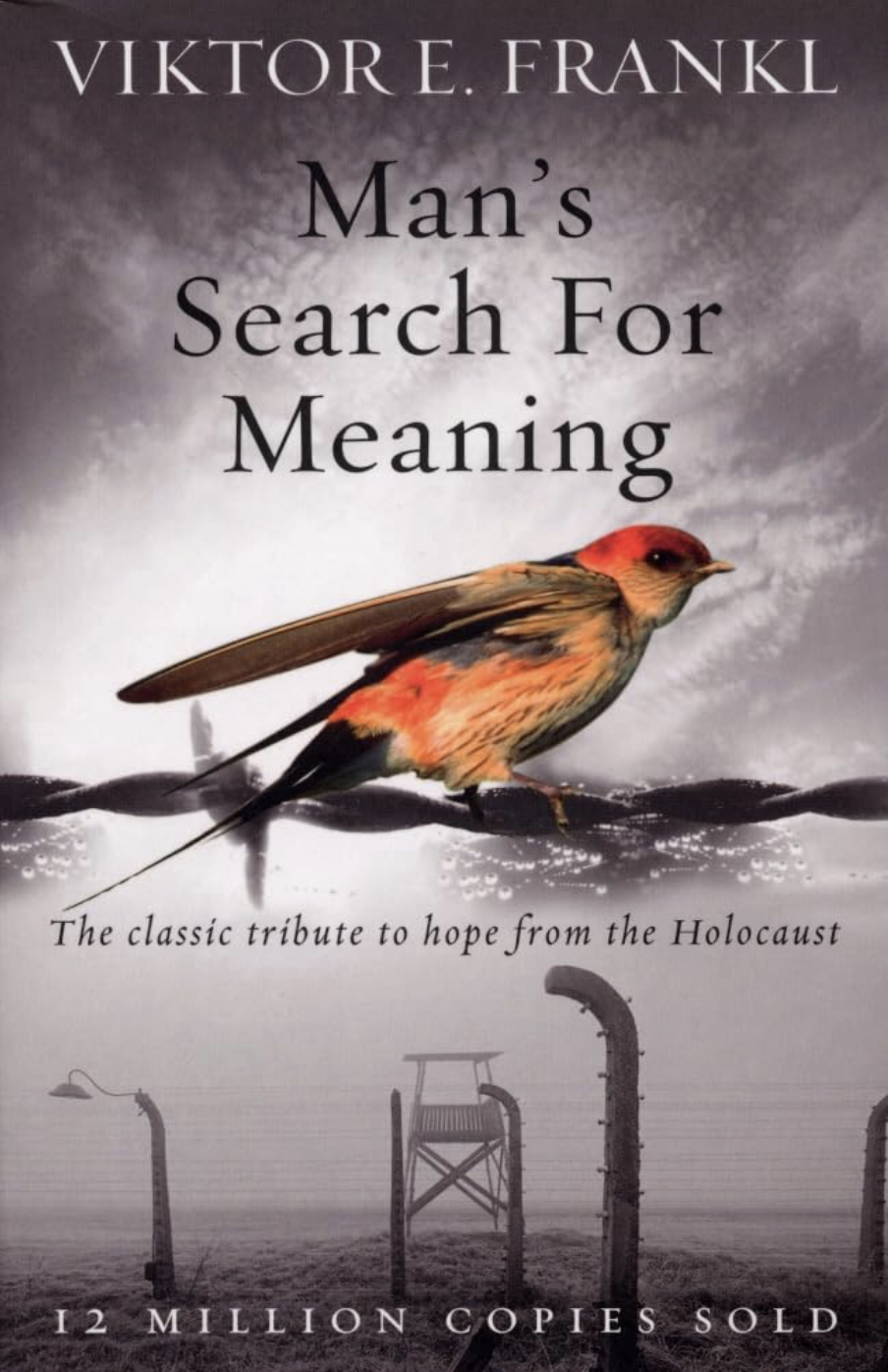Man's Search For Meaning
- Viktor Frankl
Part Holocaust memoir, part spiritual survival guide, Viktor Frankl’s Man’s Search for Meaning is a profound and personal exploration of the eternal resilience of the mind and its ability to transcend the harshest of conditions. Through the exploration of his psyche during and following life in the concentration camps, he reveals the capacity of the mind to find meaning and purpose regardless of circumstance.
Frankl was a psychiatrist when him and his family were sent to the Theresienstadt concentration camp. He spent three years across four concentration camps, accrediting his survival not just to luck, but largely to the maintenance of his spirit through his engagement with meaning, and a shift in his attitude to suffering. From this emerged his logotherapy: a form of therapy rooted in the idea that human’s primary driver is the pursuit of meaning, what he terms ‘will to meaning’.
This book is moving – his first person accounts of the horrors of the concentration camps are unfathomable. It’s also practical. Through the logotherapeutic lens, the mental health crises of our modern era are attributable to an epidemic of meaninglessness and loss of hope and purpose. The solution lies in shifting our attitude to suffering, and a proactive engagement with meaningful, purposeful living.
Meaning from Suffering
Frankl believes that any suffering can be endured and reshaped, as long as one it can be anchored to some higher meaning or purpose. He frequently references Nietzche’s words, ‘He who has a why to live can bear with almost any how’, a belief he himself used within the extremities of the camps.
Take the so-called ‘triad of suffering’: pain, guilt, and death. For each, meaning may be found. Pain as an opportunity to develop resilience, learn about who we are, or for some higher sacrifice. From guilt comes the opportunity for accountability and improvement. From grief, an appreciation of life’s transitoriness, incentive for meaningful action, and a call to existential engagement.
A positive, meaning-finding orientation to suffering flies in the face of current Western narratives. Suffering is generally considered an unwelcome interruption of our pursuit of happiness. Conceding suffering is often considered a mark of weakness. So not only do we suffer and resent that suffering, but we are then shamed for it.
This negative orientation makes sense – suffering doesn’t feel nice. However, while the feeling of suffering may be negative, the context in which it is felt need not be. Our mind is immensely powerful. Unlike most living things who are condemned to a sensory-bound aversion to suffering, our unique human capacity to abstract meaning means that we can shift the context in which it occurs, even if not the sensation itself.
We tend to ignore or repress our regrets and pains. What a waste! Enduring suffering is the hard bit. The good part happens afterwards. All it takes is a proactive engagement with our attitude to suffering to transcend its superficial negativity and turn pain into growth. Frankl was able to find meaning and purpose in the midst of absolute inhumanity and overwhelming suffering. His book is testament to the applicability of this principle to the suffering that is inherent to all lives.
Importantly, this all only applies to unavoidable suffering. Avoidable suffering is about learning. Find meaning in the unavoidable.
The Last of the Human Freedoms
The second aspect of his logotherapy refers to the eternal capacity to choose our attitudes in any circumstance.
When Frankl arrived at Auschwitz, he was stripped of all material possessions, all sense of personal identity, any sense of dignity, and any connection with loved ones. However, in this moment of bare existence, he found that his oppressors could never take ‘the ability to choose one’s attitude in a given set of circumstances’, which he terms, ‘the last of the human freedoms’. In a way, it’s like enforced Buddhism. While the Zen Buddhist strives to transcend material desire, for Frankl it was done for him. However, for both, the rewards of that material transcendence are clear. The development of their ‘spiritual freedom’ – the capacity to transcend harsh external conditions through frameworks of inner understanding.
“Man is not fully conditioned and determined but rather determines himself whether he gives in to conditions or stands up to them. So, man is ultimately self-determining.”
You may recognise this idea from Stoicism. What distinguishes them is important. Stoicism believed that virtue is the highest aspiration in life. Frankl differs in that he, like other existentialists, does not believe in a pre-determined meaning to life and that we must seek to find a meaning to our life that is authentic to who we are. The ability to do so is our most fundamental attribute.
What is Logotherapy?
Like psychoanalysis, logotherapy is about diving into the mind to find the real narratives of a patient’s life. However, it differs in that it explicitly orients around meaning, and approaches healing by fostering the ‘will to meaning’. The logotherapist looks to broaden the patient’s ability to see the full spectrum and scale of their potential meaning.
Frankl believes meaning in life can be found, broadly speaking, in three ways: through creative work, through experiences or relationships, or by the aforementioned notion of finding meaning through your relationship with suffering.
Logotherapy in the 21st Century
Frankl believed that the wild success of his book was a symptom of the ‘mass neurosis of modern times’. In other words, it reflected the notion that the greatest psychological ailment of our time is meaninglessness.
‘The consciousness of one’s inner value is anchored in higher, more spiritual things, and cannot be shaken by camp life. But how many free men, let alone prisoners, possess it?’
Frankl believed, and I’d argue his belief still holds very true, that modern society is afflicted with a pervasive sense of meaninglessness, which he referred to as ‘the existential vacuum’. He’d look at our mental health crisis as an epidemic of this meaninglessness. People without authentic purpose or meaning end up depressed, attempt to fill the void with hedonistic pursuits, or otherwise fall into psychological dysregulation. I see parallels in Gabor Maté’s accounts of those with addiction, who often describe how their suffering and subsequent compulsions arise from this existential vacuum.
Frankl notes how many prisoners of the camps had lost their faith in the future, and with that, their grounding on an inner spiritual framework that relies on some future-orientation. They became apathetic and disengaged and this spiritual decay soon resulted in physical and mental decay. The interesting question is whether it’s the loss of hope that generates the psychological profile, or is it the psychological profile that results in the loss of hope? Likely both.
Frankl vs. Western Psychology
Frankl notes the limitations of Western psychology’s tendency to pathologise neuroses, determining them faulty wiring external to our being, rather than handling them within the context of the human being behind that manifestation. I strongly believe that the human mind is not a machine with errors and bugs, but that it is a powerful mechanism of survival, and neuroses emerge as direct protective and preventative factors against suffering.
While the horrors he describes seem far removed from the stressors of most people’s lives, the psychological responses to such difficulties are the same. Frankl notes that apathy was a widespread symptom of prisoners at the camps. Prisoners would watch brutalities unphased, would walk around with blank stares and vacant eyes, would not even react to their own beatings. In a modern context, this would be considered anhedonia, one of the most commonly reported symptoms of chronic depression. From my personal experience, the brain enters this state to protect itself – it prevents immersion in life because the pain is too great. Many with depression will testify to this sensation. This aligns with other symptoms, like the often-reported ‘greying’ of life, the loss of motivation to engage with joyful pursuits, and a sense of hopelessness and loss.
The logotherapeutic route to psychological treatment is inherently a bit detached from the empiricism that guides most modern-day psychology, particularly within the NHS. It relies on the subjective meaning-finding of a patient, orienting treatment through whatever is found, as opposed to more CBT-type approaches that deal with symptoms, triggers, and broader psycho-education.
My Relationship with Suicide
Suicidal people will often speak of how ‘there’s no point’, ‘it’s just suffering, why do I continue to live?’. In more difficult times, I’ve believed these same things myself.
In the preface, it’s mentioned how Frankl sometimes asks his patients ‘Why do you not commit suicide?’. As Frankl notes from his own therapeutic practice, the reason that spares someone is likely the same reason that can provide meaning in their life. For example, in answer to that question I would answer, in no particular order: because I am loved and it would be a horrible thing to inflict on others, because I’m curious about knowledge, and because I like to make a positive difference in the lives of those suffering. From those, the meaning for which I live can be found: to build and maintain healthy relationships with loved ones, to explore and contribute to knowledge, and to alleviate the suffering of others. It’s helpful to have these when things are tough, and for those ever in the realm of suicide, I recommend asking yourself the same. You may find there are answers, even if in that current moment they seem insignificant in the face of overwhelming pain.
I’m often acutely aware that I’m only still alive to spare others of my death. Through all my suffering, the damage my death would do and the pain it would cause was enough to not follow through. I remember someone saying ‘committing suicide is like taking your pain and spreading it amongst to all your loved ones’. While at sadder times I’ve resented my decision to stay alive and felt bitter at its seemingly obligatory nature, logotherapy tells me there is some meaning that can be ascribed to it. This sacrifice has spared others of suffering. That’s worth something. Understanding my suffering and choice to stay alive within that context has positively shifted a previously pained acceptance.
As a final thought, ask yourself: What is your relationship with suffering? Do you hide from it, and allow it to quietly erode you from within, or do you strive to transcend your pain, taming it into meaningful growth?

Viktor Frankl (1905-1997) was an Austrian psychiatrist. He was treating young suicidal women when he was taken to the concentration camps. His development of logotherapy has had an enormous influence on the development of more existential approaches to psychological treatment.

